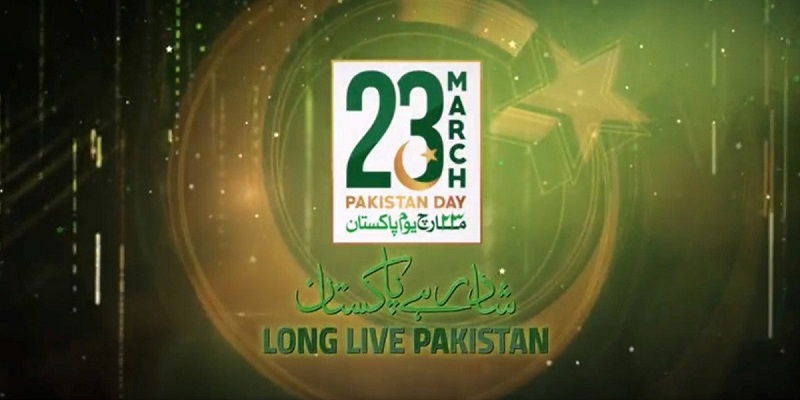The country’s armed forces showcased their strength in the annual military parade in Islamabad on Wednesday, while leaders attending the 48th Session of the Council of Foreign Ministers of the Organisation of Islamic Cooperation (OIC) looked on as guests of honour.
On March 23, 1940, the All-India Muslim League passed the Lahore Resolution, which advocated a separate nation for the Muslims of the British India Empire.
The day began with a 31-gun salute in the federal capital and a 21-gun salute in the state capitals, according to Radio Pakistan.
In Karachi and Lahore, respectively, a change of guards ceremony took place at the mausoleums of Quaid-i-Azam Mohammad Ali Jinnah and Allama Iqbal.
LIVE #APPNews : Change of Guards ceremony #Lahore https://t.co/PK3TLHwuso
— APP 🇵🇰 (@appcsocialmedia) March 23, 2022
Special prayers for Pakistan’s success and prosperity were said in mosques following the Fajr prayer.
The huge military parade in Islamabad, in which three contingents of the armed forces and other security personnel marched while fighter planes performed aerobatic manoeuvres, was the highlight of the day.
The exhibits were attended by Prime Minister Imran Khan, President Arif Alvi, the three service chiefs, federal ministries, officials and foreign ministers from 57 Muslim countries that are members of the OIC.
23 March: Today we commemorate the Resolution for the founding of a separate homeland for the Muslims of the subcontinent – our beloved homeland Pakistan. My Party & govt are committed to carry forward the vision of our Quaid Jinnah for a just society & a sovereign welfare state.
— Imran Khan (@ImranKhanPTI) March 23, 2022
Following the mesmerising display of Pakistan Air Force aircraft, parachuters from the Pakistan Army, Air Force, and Navy showcased their abilities by free-falling from 10,000 feet. Major General Adil Rehmani, the General Officer Commanding (GOC) of the Special Services Group (SSG), then presented the flag of Pakistan to President Alvi. The parachuters were then given a gun salute.
Following the demonstration, each province’s float made a circuit of the site. For the first time, Jammu & Kashmir also gave a presentation this year. The float for the region included a small replica of Srinagar’s famed Dargah Hazratbal. It also held banners of martyred liberation fighters in Indian-controlled Kashmir.
President Alvi stressed in his speech that Pakistan was a responsible nuclear power that wanted peace with all nations and respected their sovereignty.
He made it plain that Pakistan would never jeopardise its security or sovereignty, and that any aggression directed against it would be met with force. “I am confident that our nation would not hesitate to sacrifice for the sake of the country’s security,” Alvi continued.
The president cited extremism and the proliferation of fake news as two of society’s most pressing issues, and urged researchers, parents, and teachers to have a role in addressing these issues.
To commemorate the historical significance of Pakistan Day, a variety of organisations and departments have scheduled a range of activities, including seminars, conferences, and discussion programmes.
23 March: Today we commemorate the Resolution for the founding of a separate homeland for the Muslims of the subcontinent – our beloved homeland Pakistan. My Party & govt are committed to carry forward the vision of our Quaid Jinnah for a just society & a sovereign welfare state.
— Imran Khan (@ImranKhanPTI) March 23, 2022
‘Honesty, morals, and discipline’
Prime Minister Imran Khan highlighted in his speech to the nation that the country was born after a tedious democratic struggle and that the key to its success was “hard work, honesty, and morality.”
“We must recommit ourselves to Quaid-i-Azam Mohammad Ali Jinnah’s values of Unity, Faith, and Discipline, and rededicate ourselves to developing Pakistan as a truly democratic welfare state based on the Riyasat-i-Madina model.”
“On this day, it is appropriate to focus on the issues that we face as a country,” he remarked.
The PM went on to say that his government has implemented long-term reforms and measures to ease poverty and promote justice, and that his government’s focus would continue to be on marginalised groups and how to offer them with equal chances.
“We are now on the road to reclaiming our former splendour, which was shattered by previous administrations that prioritised self-interest over national interest and the wellbeing of the people.”
“The fight to eradicate corruption and restore moral standards will necessitate the same perseverance that our founding ancestors showed throughout the liberation movement,” the prime minister stated.
Works at The Truth International Magazine. My area of interest includes international relations, peace & conflict studies, qualitative & quantitative research in social sciences, and world politics. Reach@ [email protected]










